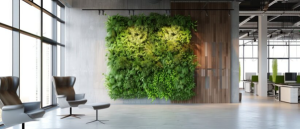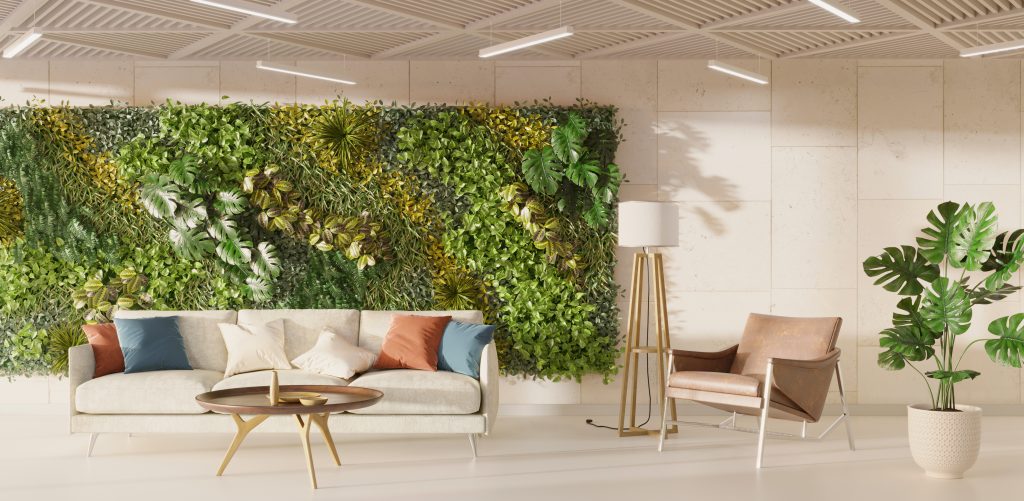As we move into 2024, landscaping trends for commercial spaces continue to evolve, reflecting broader shifts in sustainability, technology, and design aesthetics. From embracing biophilic design principles to implementing smart irrigation systems, these innovations are reshaping how businesses approach their outdoor environments. Here’s a look at the top landscaping trends that are set to define commercial spaces this year.
Biophilic Design: Bringing Nature Indoors
Biophilic design is gaining traction as a key trend in commercial landscaping. This design philosophy focuses on creating spaces that connect people with nature, aiming to enhance well-being and productivity. For commercial properties, this means integrating natural elements into the landscape to create a harmonious environment. Features might include:
- Green Walls and Roof Gardens: Vertical gardens and green roofs not only improve air quality but also provide aesthetic appeal and thermal insulation.
- Water Features: Ponds, fountains, and streams add a soothing soundscape and visual interest, enhancing the sensory experience of the space.
- Natural Materials: Incorporating materials like wood, stone, and bamboo can create a more organic and inviting atmosphere.

Sustainable and Eco-Friendly Practices
Sustainability remains a top priority in landscaping, with businesses increasingly focusing on eco-friendly practices. Key trends in this area include:
- Native Plant Landscaping: Using native plants reduces water consumption, minimises the need for pesticides, and supports local wildlife. These plants are well-suited to the local climate and soil, making them a practical choice for commercial landscapes.
- Rain Gardens and Bioswales: These features manage stormwater runoff, improve water quality, and prevent erosion. They also add visual interest and can be designed to integrate seamlessly with the overall landscape.
- Composting and Organic Fertilisers: Adopting composting practices and using organic fertilisers helps reduce waste and environmental impact, promoting a healthier landscape.
Smart Irrigation Systems
Advancements in technology are revolutionising landscape irrigation. Smart irrigation systems offer numerous benefits for commercial spaces:
- Automated Scheduling: Smart systems can adjust watering schedules based on weather conditions, reducing water waste and ensuring optimal plant health.
- Soil Moisture Sensors: These sensors monitor soil moisture levels and adjust irrigation accordingly, preventing over or under-watering.
- Remote Control: Many smart systems can be managed via mobile apps, allowing for real-time adjustments and monitoring from anywhere.
Outdoor Workspaces and Meeting Areas
As remote work and flexible office arrangements become more common, commercial spaces are adapting by creating functional outdoor areas. Key elements include:
- Outdoor Meeting Rooms: Equipped with comfortable seating, shade structures, and even AV equipment, these spaces provide a refreshing alternative to indoor meetings.
- Collaborative Zones: Designated areas with communal seating and tables encourage social interaction and teamwork in a natural setting.
- Recreational Spaces: Incorporating elements like outdoor games, exercise equipment, or relaxation zones can enhance employee well-being and productivity.
Low-Maintenance Landscaping
In today’s busy world, low-maintenance landscaping solutions are becoming increasingly popular for commercial spaces. These include:
- Drought-Tolerant Plants: Plants that require minimal water and care are ideal for reducing maintenance efforts and ensuring year-round attractiveness.
- Hardscaping Elements: Features such as gravel paths, decorative stones, and permeable paving can complement plantings and reduce the need for extensive upkeep.
- Artificial Turf: Modern artificial turf options look realistic and require little maintenance compared to natural grass.
Interactive and Community-Oriented Spaces
Creating interactive and community-focused landscapes can enhance engagement and foster a sense of belonging. Trends in this area include:
- Community Gardens: Providing space for employees or local residents to grow their own plants can strengthen community ties and promote sustainability.
- Art Installations: Incorporating sculptures, murals, or other artistic elements can add character and create a unique identity for the space.
- Educational Features: Installations that highlight sustainable practices, local flora, or environmental education can raise awareness and encourage responsible behaviour.
Lighting Innovations
Innovative lighting solutions are transforming how commercial landscapes are experienced after dark:
- LED Lighting: Energy-efficient LED lights offer durability and versatility, with options for accent, pathway, and security lighting.
- Smart Lighting Systems: These systems can be programmed to adjust brightness and colour based on time of day or events, enhancing the functionality and ambiance of outdoor spaces.
- Solar-Powered Lights: Harnessing solar energy for outdoor lighting reduces electricity costs and supports sustainability goals.
Conclusion
The landscaping trends for commercial spaces in 2024 reflect a growing emphasis on sustainability, technology, and well-being. By embracing biophilic design, implementing smart irrigation systems, and focusing on eco-friendly practices, businesses can create attractive and functional outdoor environments that enhance their overall image and contribute to a positive customer experience. Staying ahead of these trends will not only improve the aesthetic and practical aspects of your property but also demonstrate a commitment to innovation and environmental stewardship.


